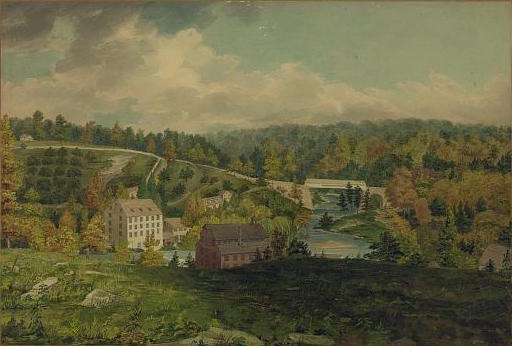
Mills like this one on the Brandywine River were technological markers of intellectual improvement as well as material progress for America in its youth.
New Year’s Day is traditionally a time for forward-looking resolutions designed to improve attitudes, habits, and life in general, but in that respect resolutions require a backward look at what is wrong and needs fixing. Americans now are not so different in that human essential from those of previous generations. A few years ago, we wrote a social history about daily life in the United States from the advent of the Constitution to 1820. In addition to mundane matters of how those Americans grew crops, built houses, conducted courtships, and married, we took a broader view in our conclusion about the state of mind of Americans as they began to write another chapter of their great experiment in prosperity and liberty. It was a happier time in that many of our countrymen in those days could go weeks, even months without thinking about government, and certainly almost never about what it could do for them. If anything, they were extremely vigilant about what government could do to them. They were also gripped by a majestic optimism and sense of boundless opportunity, despite their many problems. True enough, some of those problems proved nearly insurmountable, short of a catastrophic divide that would cost 600,000 lives but reaffirm the allegiance to freedom as a fundamental principle.
In 1820, however, anything seemed possible for Americans who had the good sense to know that being imperfect was not the same thing by a long mile as not being any good. The following is an adapted excerpt from Daily Life in Early American Republic, 1790-1820: Creating a New Nation. It seems appropriate to consider as we, like they, begin today to write another chapter of what everyone should hope will continue to be our great experiment in prosperity and liberty. Happy New Year!
——————
In 1820, the industrial revolution and what later generations called consumerism––people of the early Republic would have called it material progress — crushed eighteenth century social and economic theories about the rigidity of class systems. What happened in those pivotal years in America should also discourage the modern tendency to dismiss the buying and selling of things as coarse consumerism and exploitative commercialism. European intellectuals asserted that only necessity made poor people work, but the American experience revealed that theory to be nothing more than condescending hogwash, to use an Americanism grating to European years. In America, aspirations to a better life encouraged and emboldened all classes, a circumstance that was a true break from old European ideas of society and the proper place for people in it. By acquiring the material comforts of more elevated social classes, one could reach a state of gentility. The result might be seen as a paradox for the earnest republicans who rejected kings and disdained aristocrats, but it wasn’t really. By making gentility the normal course of progress for ordinary people, Americans turned the trappings of aristocracy into a hallmark of democracy. In America, where anybody could achieve the status of “gentleman” or “lady” through hard work, anything was possible, even the emancipation of slaves, eventually. European observers might have assumed that the reward for hard work –– the accumulation of material comfort –– was merely another example of America's lack of refinement, but that snobbish attitude missed the point. In America the accumulation of material comfort was an evolutionary step to the creation of a society far different from that imagined in the doomsday predictions of a Malthus and more egalitarian than any envisioned by the violent prescriptions of a Marx.
The changes that marked America during these years were not entirely about the getting of things. Americans were a literate people because of their religious convictions as well as the economic necessities they confronted and political obligations they met. Foremost they believed that only educated citizens could preserve free government. Inherited as part of the Puritan legacy of learning, America's thirst for knowledge either matched or surpassed any other place in the world. Furthermore, the concerns prompted by religious revivalism meant a growing compassionate impulse that found expression in charitable institutions, embryonic abolitionism, and reform movements fighting alcoholism, prostitution, and rampant gambling. Rather than the product of a persistent, grim Puritanism, these efforts were a demonstration of poignant faith in the betterment of mankind, a logical melding of Enlightenment rationalism with romantic optimism.
In any case, Americans were not always toiling to better themselves or improve others. They took time to court, to marry, to make love, to raise children, to laugh, to stroll country lanes or city parks. The ordinary American in 1820 might well have described life by distilling it to such essentials. Americans’ philosophical embrace of the principles that had driven the revolution a generation earlier did not mean that they were necessarily a philosophical people. They inclined toward action rather than introspection, and the liberties they enjoyed were tangible evidence of sacrifices, not abstract rhetorical flourishes for a political speech. The dangers of the world they held at bay, the boiling discontents of home they ignored or tried to alleviate, the timeless routines of life, love, and death they experienced in joy and sorrow– –such was the stuff of that life so many years ago, the changeless exception to the absolute law of change, reminding us that in its essentials, the play is always the same, and only the actors, with each generation, are different.